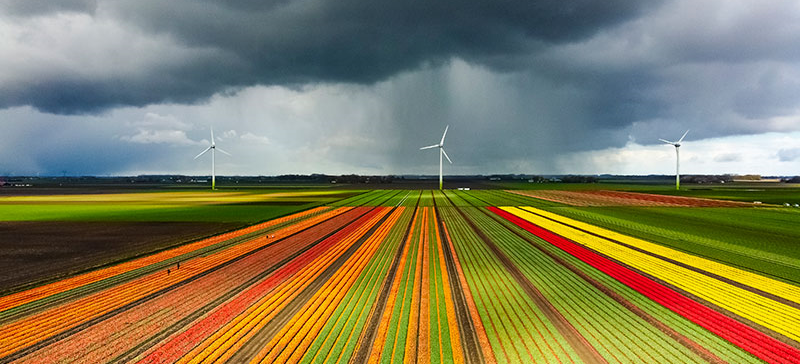Author: Ian D Rotherham, Emeritus Professor, Advanced Wellbeing Research Centre, Sheffield Hallam University

It is absolutely clear that we are in the midst of not a single ‘crisis’ but a whole raft of crises of different types and scales but all intimately interrelated. From global pandemic(s) to war in Europe, and growing disparity between rich and poor nations, and rich and poor people, human society and its planetary systems seem disjointed and de-stabilised. Behind all of these worrying trends there lie omnipresent spectres of global climate change, increasing extreme weather event, and the catastrophic loss of biodiversity and especially of the habitats upon which it depends. Furthermore, associated with the latter there is extending land cultivation for food and use for grazing livestock but these are in tandem with not only habitat loss but the rapid degradation and erosion of soils. Given this stark vision of planetary meltdown it is also apparent that politicians are failing to act and are unable to resolve the issues.
So what’s to be done? Perhaps instead of relying on politicians to act for us and on our behalf, communities, individuals, and businesses can take up the global ecological challenges. Indeed, worldwide commercial organisations and philanthropic bodies established by wealthy entrepreneurs have frequently led the way on undertaking ‘public good’ initiatives – such as the Gates Foundation and the malaria crisis for instance. There are others. In my home city of Sheffield, the business entrepreneur and indeed pioneer of catalogue selling, J G Graves, led the way in the early twentieth century to buy and gift to the city areas of land protected from urban development and bequeathed as public greenspace for ever. This has always been the way that visionary business leaders sometimes switch from merely making money to investing in people and places. Is this something we can develop and harness to help solve the current apparently unsolvable crises?
A big problem with global catastrophe is that the challenges are so frightening that people and societies feel unable to act with any degree of effect or impact and therefore feel powerless in the face such threats to themselves, their families and their futures. Yet the old mantra from the early days of thinking on ‘sustainable development’ was to ‘Think global, act local’, and perhaps this is where potential answers lie. If society’s issues and responses are the summation of the actions and demands of individuals, then surely by harnessing all these individual acts, the problems can be resolved. For politicians for example, if we can move from dealing with the minutia of intra-party in-fighting and inter-party competition, then perhaps they could focus more effectively on the bigger and indeed ‘real’ issues. Of course a fundamental problem is that the eco-crisis requires visionary long-term actions and plans whereas politicians generally think and react to the short-term. Maybe local communities need to drive their politicians towards more effective actions though their own activities to take action for ecology, climate, and people – at a local level. Perhaps the solution to global challenges is to build responses from the ground upwards and trigger policy responses rather than wait for these to happen before taking action.
Again, in dealing with climate and ecology, business managers and entrepreneurs can actually lead the way. This is particularly so when crises trigger economic opportunities for those who can see them and exploit them and when entrepreneurs are more fully immersed in their own local communities. One person’s crisis may be another’s opportunity. Turning the eco-crisis on its head whereby the problems are laid at the door of exploitative business and commerce, can entrepreneurs be the solution? I think the answer is yes they can as long as they and their business managers are environmentally fit for purpose and able to deliver the necessary responses. This then begs the question of whether we are producing the managers and directors with awareness and skills sets to rise to these challenges.
So what does this all mean and how might it operate in practice? I will take observations and ideas from my own region in South Yorkshire, UK, as a case in point. The low lying regions are flatlands reclaimed from a once-great peat fen and now either intensively farmed for arable crops, or else increasingly built on for massive business parks and distribution warehouses. All this is on floodplain and the consequences are major flood-risk for the region, catastrophic declines in biodiversity, carbon haemorrhaging from the peat-fen landscape to exacerbate climate change, high unemployment, and poor quality of life and health for many local people. Indeed, the processes driving the changes which bring all these detrimental impacts seem almost unstoppable and local communities are powerless. In fact if you drive along almost any major motorway system you will see similar scenarios extensively throughout the UK and elsewhere in the world.
Yet this change and this situation are not inevitable. At present none of these vast warehouses and distribution centres has any of the following: solar energy capture, wind power generation, rainwater harvesting, or positive biodiversity and greenspace enhancement. If all these new-build premises generated power, harvested and stored rainwater, and had green landscapes with wetlands, wildflower meadows, woodlands, and features like bird boxes, bat boxes, swift nesting sites, bug boxes, pollinator gardens and more, then we start to square the eco-crisis circle. Built in to new-build or retro fitted to old, this approach delivers corporate responsibility targets, carbon and energy targets, and leads to a healthier, happier and more productive workforce too. The costs can be minimal and things like reduced energy bills would repay the initial investment. Furthermore, if all this infrastructure is designed, manufactured and serviced locally, then there are opportunities for small business ventures to provide the services. This can be taken further with local schools, colleges, and universities, by creating opportunities to train young people to deliver all these goods, and for them to have a more positive future whilst helping solve global crises from the ground up. Politicians might help lead the way by simply legislating to make the processes compulsory for developments – from business and commerce to residential homes too, and business leaders can grasp the opportunity to grow new enterprises responsibly.
Finally, in my case study of South Yorkshire we have the agricultural and horticultural sector spread across many square miles of this former peat fen floodland. In a region which must become carbon-neutral for climate reasons, this is a massive eco-disaster with vast amount of carbon released from the soil, land shrinkage to become more flood-prone, on-going drainage desiccating the landscape, but with irrigation needed to water the crops, and soil loss meaning perhaps fifty or fewer harvests left. Clearly unsustainable we need the business leaders of the farming and horticultural enterprises to look up and take notice. Indeed, some farmers and bigger landowners are making a seismic shift towards less intensive land-use and even towards ‘rewilded’ estates. The trick is to maintain profitability by farming better and smarter but ecologically too. The present-day business model of farms heavily subsidised by petrol fuel, and petrochemical fertilisers has worked for maybe fifty years but the havoc wreaked is now apparent. Farm business entrepreneurs are now leading the way to new systems and holistic approaches to grow crops, sometimes to harvest solar energy and wind-power, to capture carbon and gain carbon credits, and to slow the flow to reduce flood-risk. We are moving to a new era where these businesses in partnership with local communities, with conservation agencies and NGOs are solving the global crises from the bottom upwards.
This shows what can be done and indeed, what must be done. And yet some managers still seem blind to the obvious nature of the eco-crisis and to their corporate and personal roles in this and in finding solutions. So in my case-study region there is a major horticultural business producing composts for retail and wholesale on a British and European scale; and their main operation is still harvesting or rather mining peat from wonderful, carbon-rich, biodiverse peat-bogs. This is a major cause of biodiversity decline, of landscape degradation, and perhaps worst of all, a huge release of carbon to the atmosphere from the desiccated bogs and the processed peat composts. Despite being offered exciting and innovative ways to maintain a successful business to continue producing peat-free composts and to support local farmers with innovative new crops and economies in order to do this, they persist in environmental destruction. This is the worst sort of short-term blinkered management which ignores personal and corporate eco-responsibility and also fails to grasp opportunities to lead the way to long-term profitability. Entrepreneurs and organisational managers can and must lead the way, but first of all they must pen their eyes to the crises, to the solutions, and to their future roles and opportunities.
Ian D Rotherham is Emeritus Professor at the Advanced Wellbeing Research Centre, Sheffield Hallam University, in Sheffield, UK. He is an ecologist and environmental campaigner working with local communities, local authorities, businesses, farmers, and landowners on environmental issues and solutions. He has written and edited around 50 books and over 500 academic papers and around 1,000 popular articles. He works extensively with the media at all levels and on social media too: UKEcone, ianswalkonthewildside, @IanThewildside.

Responsible management
We aim to champion researchers, practitioners, policymakers and organisations who share our goals of contributing to a more ethical, responsible and sustainable way of working.
